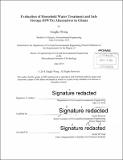Evaluation of household water treatment and safe storage (HWTS) alternatives in Ghana
Author(s)
Wong, TengKe
DownloadFull printable version (11.62Mb)
Other Contributors
Massachusetts Institute of Technology. Department of Civil and Environmental Engineering.
Advisor
Susan Murcott.
Terms of use
Metadata
Show full item recordAbstract
Ghana's water quality and sanitation condition are very poor. Pure Home Water (PHW), a local non-profit organization has been successfully improving the supply of safe drinking water in the northern region by producing and disseminating ceramic pot filters to low income family. In order to further their impact, PHW decided to explore the possibility of a new for-profit water filter targeted at the middle and high income families. For this purpose, the author evaluated the water quality of 42 households using bacteria indicator to determine whether there is a need or market for Household Water Treatment and Safe Storage (HWTS). Findings clearly show there is a market, given that Accra and Tamale two of the biggest cities in Ghana suffer severe intermittent water supply and water quality degradation. In addition, the author conducted 82 household surveys to understand their water practices and their knowledge, preferences, attitudes and motivation for HWTS purchase. Findings show that there is awareness of the water quality issue but not much knowledge about household water treatment. The survey also shows Gravity Driven Membrane (GDM) and Ceramic Pot Filter have the potential to do best in the market. PHW may either partner with EAWAG and sells GDM as its high-end product, or further develop its own product by taking recommended product features into design. Payment via monthly installments with small initial investment may encourage purchase.
Description
Thesis: M. Eng., Massachusetts Institute of Technology, Department of Civil and Environmental Engineering, 2014. Cataloged from PDF version of thesis. Includes bibliographical references (pages 55-59).
Date issued
2014Department
Massachusetts Institute of Technology. Department of Civil and Environmental EngineeringPublisher
Massachusetts Institute of Technology
Keywords
Civil and Environmental Engineering.